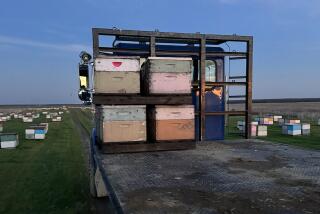Pygmy Study Shows Bees’ Sweet Side
- Share via
California farmers may be afraid of killer bees, but they don’t scare the tiny Mbuti Pygmies of Zaire, according to anthropologist Kevin Duffy of Reseda.
While doing fieldwork with the Pygmies in the Ituri forest and elsewhere in Africa, Duffy has been stung dozens of times by African bees, usually in the course of hungrily pillaging their hives, he said.
But in tribal Africa, the typical response to a bee is to run toward it. Bees mean honey, which is worth a sting or two in those parts of the world where it doesn’t come in jars.
“Even more than meat, honey is an exciting discovery,” Duffy said.
‘Courageous’ Mbuti
Duffy, 56, a free-lance anthropologist and film maker, went on frequent bee hunts while living with the Mbuti in 1981. The Mbuti are believed to be the world’s smallest people. They are the subject of a documentary film and recent book by Duffy, both called “Children of the Forest.”
“They are very courageous,” he said of the Mbuti, whose males are rarely more than 4 feet, 8 inches tall. “If they hunt an elephant with a hand-held spear, they’ll hunt anything.”
Even killer bees.
Honey is the Mbuti’s favorite food, and the diminutive hunter-gatherers are willing to climb 60-foot trees to steal the honey from treetop hives. Unlike most labor in the forest culture, which is done by women, fighting off bees in the trees is man’s work.
Dealing with killer bees 60 feet in the air with a baby on her back is a bit much, even for a hard-working Pygmy.
Since the first colony of Africanized bees found in the United States was discovered near Bakersfield, the African varieties have been described as less productive than other bees. But Duffy recalled finding hives fairly dripping with sweet stuff.
“There was almost always enough to make it worth walking a mile through the bush for,” Duffy said. “Sometimes there was so much we couldn’t eat it all. We would wrap it up in leaves and take it with us to eat later.”
Although honey will keep almost forever, it rarely lasts long among the Pygmies. “It’s too nice,” Duffy recalled. “The kids want it. The adults want it. It just goes.”
Besides, the Mbuti may be small, but they’re not dumb. They have better sense than to keep the fragrant, sticky foodstuff lying around in the little beehive-shaped huts of sticks and leaves.
‘I Ran’
“It would attract bees, and they’d sting you,” he said.
Duffy said he was once chased by a single bee. “I ran. It was most undignified.”
There are many varieties of African bees, Duffy said. But none that he encountered ever swarmed a victim, the reputed behavior that has inspired killer-bee nightmares in Americans since the African strain got loose in Brazil and began mingling with New World bees.
It is conventional wisdom in the African bush, however, that some hives contain more aggressive occupants than others.
Once the Mbuti locate a hive, they may light a fire under it to disorient the bees--if they have fire with them, something they have not yet discovered how to make, Duffy said. They then hack the hive open and chow down.
You want honey, you expect a few stings.
The Mbuti, Duffy said, typically shrug off the pain while muttering something on the order of “nasty little things” in Kingwana, the language of the forest tribe.
Duffy told a tale of what he said was the only incident of fear of bees he experienced in Africa:
Honey Guide
The Mbuti and others often find beehives by following a sparrow-sized bird, called the honey guide, that seeks out humans and leads them to the hive. The bird depends on the kindness of non-avian strangers to smash open the hive so it can also feed, not necessarily on honey, as the Pygmies believe, but on beeswax.
After one honey hunt, Duffy recalled, an African suddenly became fearful and refused to return to battle against the bees.
“He was under the impression that we hadn’t left any honey for the honey guide. He was afraid that this particular honey guide was angry and that next time it would lead us to a dangerous animal or a large snake. His wasn’t fear of being stung, but fear of the supernatural.”
The Mbuti also eat the live bee larvae that come as a culinary bonus in their wild honey. So did Duffy. The grubs are a good source of protein, he said. And when he was hungry and thirsty enough, he found, they had a milky quality that contrasted nicely with the honey.
More to Read
Sign up for Essential California
The most important California stories and recommendations in your inbox every morning.
You may occasionally receive promotional content from the Los Angeles Times.










